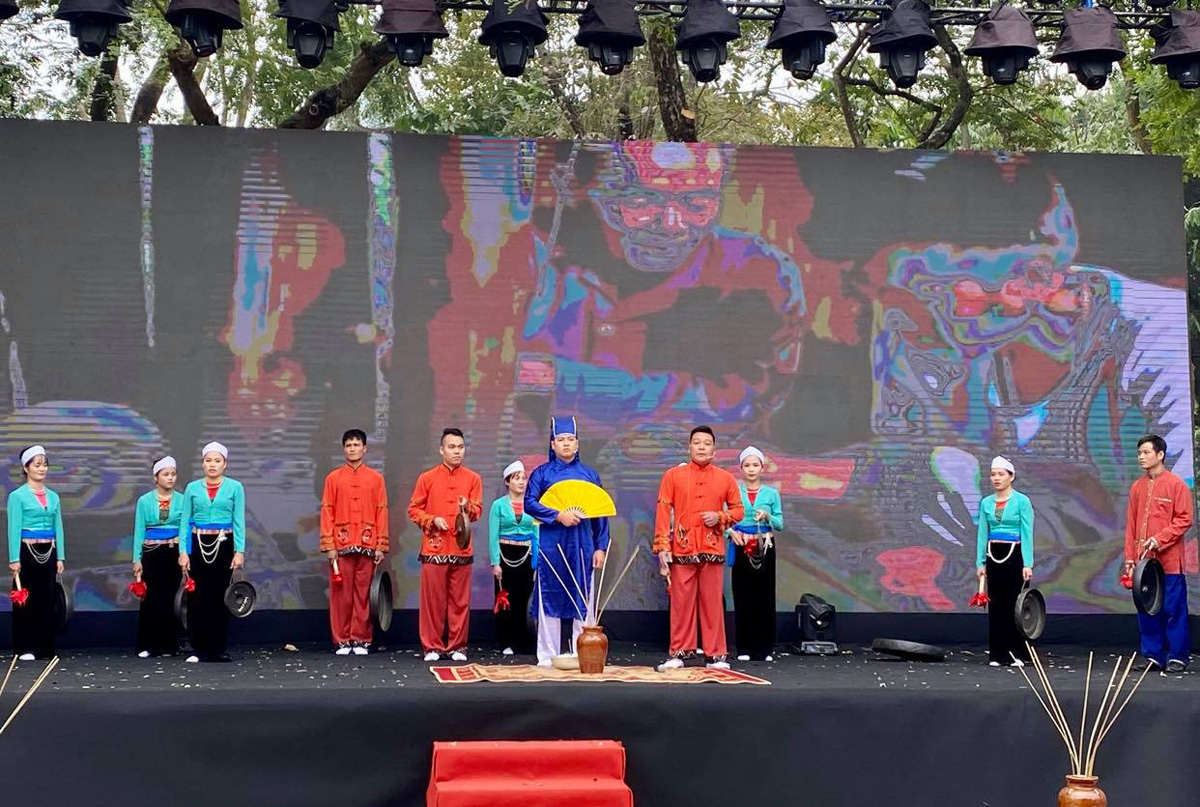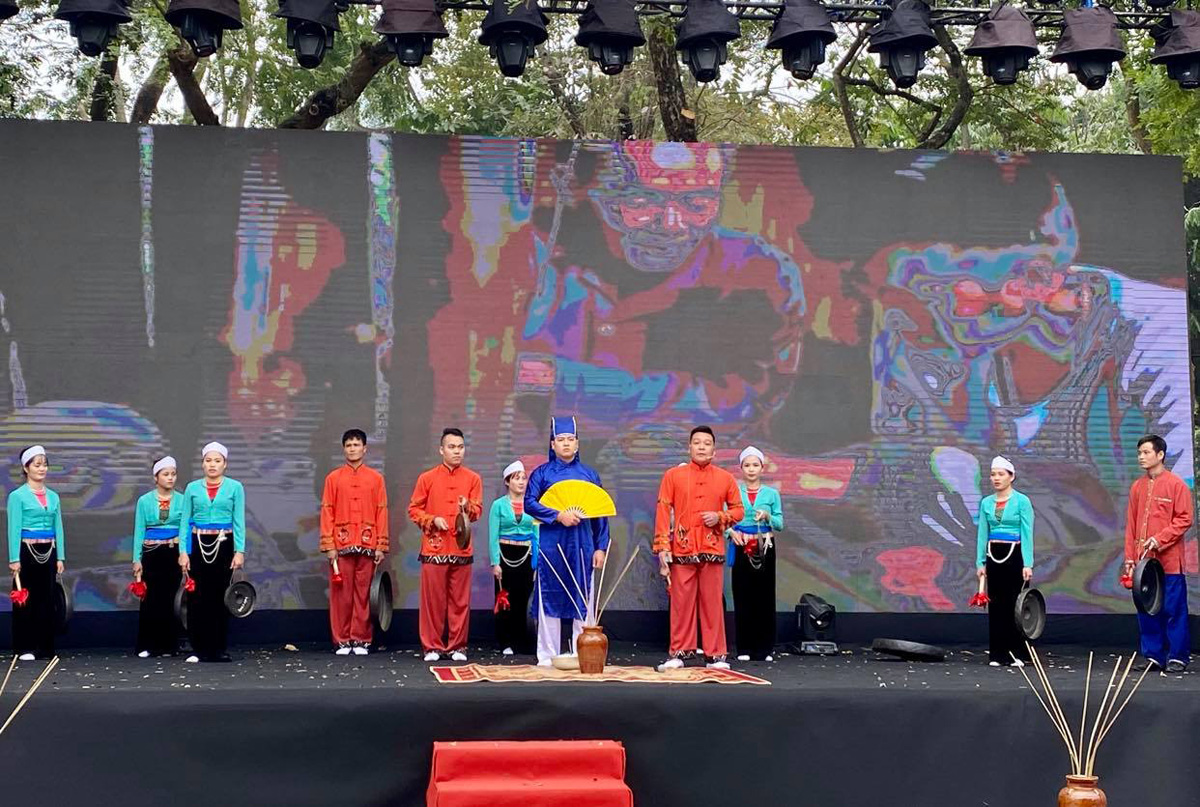
(HBO) – According to chief of Tan Lac district’s Culture and Sport Division Dinh Son Tung, in order to further enhance the preservation and upholding of cultural values in the locality, the district has continued directing and encouraging the establishment of Muong gong and folk singing clubs, especially Mo Muong clubs. In late March or early April, a district-level Mo Muong cultural value preservation club is scheduled to make its debut. Earlier, similar clubs were set up in Nhan My, My Hoa and Phong Phu communes.
 Young generations in Phong Phu commune, Tan Lac
district, practise mo rituals and perform Muong folk songs and gong during the Hoa
Binh Culture-Tourism Festival in Hanoi.
Young generations in Phong Phu commune, Tan Lac
district, practise mo rituals and perform Muong folk songs and gong during the Hoa
Binh Culture-Tourism Festival in Hanoi.
Four years ago, with the attention and guidance of the
Culture and Sport Division and in collaboration with the district’s Women’s Union,
the Muong ethnic culture preservation club was founded and put into operation in
Ngoi hamlet, Suoi Hoa commune, gathering many women as a core nucleus in local
culture-art movement.
joining the club, they were taught how to play gongs, sing
folk songs and perform folk dances. Additionally, they were able to join
regular cultural exchanges and hand them down to later generations. The club is
developing community tourism in Ngoi hamlet, contributing to popularising
cultural values. In late 2019, a similar club was set up in Dinh hamlet, Man
Duc town with the participation of many generations and members of associations
and mass organisations such as women, youths, farmers and the elderly.
In compliance with the Directive No.07-CT/HU dated October
19, 2016 on strengthening the Party leadership on the maintenance, preservation
and upholding of Mo Muong cultural values, six clubs were set up last year with
more than 100 Mo Muong artists and members. In Nhan My commune, there were four
inter-hamlet clubs, including Co – Thong – Ban – Doi with 10 members, Muong –
Da – Ta with six members, Ao – U – Chieng with 17 members, Trang – Song – Khi
with 14 members, Phong Phu commune’s club with 32 members, My Hoa commune’s
club with 35 members.
Also according to Tung, residents of Muong Bi ancient land –
the cradle of Hoa Binh culture - are striving to preserve special cultural values
of the locality. In recent years, many traditional festivals such as summer
festival, fishing festival in Lo Son commune, and Ke pagoda festival in Phu Vinh
commune have been restored, thereby raising public awareness of preserving and
maintaining traditional culture while enriching local residents’ spiritual
lives. Each year, the district opened training courses on playing Muong gongs
and singing folk songs. More than 1,000 Muong gongs were preserved.
The establishment of clubs aims to raise public awareness of
the effort. The local Party Committee and authorities always encourage and offer
support to clubs, especially those involved in preservation and upholding of
cultural values in hamlets and communes. The district also encourages artisan
clubs to continue practice and teaching, combine cultural identity with
community-based tourism activities, thereby contributing to making positive
changes in the effort./.
With an increasingly vibrant and widespread emulation movement aimed at building cultured residential areas and cultured families, Yen Thuy District has been making steady progress toward improving both the material and spiritual well-being of its people, while fostering a civilized, prosperous, beautiful, and progressive community.
Once lacking recreational spaces and community facilities, Residential Group 2 in Quynh Lam Ward (Hoa Binh City) has recently received attention for the construction of a new, spacious, and fully equipped cultural house. The project followed the model of state support combined with public contributions in both labor and funding.
The "All people unite to build cultural life" movement, which has been effectively integrated with Kim Boi district’s socio-economic development goals, is fostering a lively spirit of emulation across local residential areas, hamlets, villages, public agencies, and enterprises. In addition, through the initiative, traditional cultural values are being preserved and promoted, while community solidarity and mutual support in poverty reduction and economic development are being strengthened.
A working delegation of the Hoa Binh provincial People’s Committee led by its Permanent Vice Chairman Nguyen Van Toan on June 11 inspected the progress of a project to build the Mo Muong Cultural Heritage Conservation Space linked to tourism services in Hop Phong commune, Cao Phong district.
Born and growing in the heroic land of Muong Dong, Dinh Thi Kieu Dung, a resident in Bo town of Kim Boi district, in her childhood was nurtured by the sweet lullabies of her grandmother and mother. These melodies deeply imprinted on her soul, becoming an inseparable part of her love for her ethnic group's culture. For over 20 years, this love for her hometown has driven Dung to research, collect, and pass down the cultural values of the Muong people to future generations.
In the final days of May, the Ethnic Art Troupe of Hoa Binh Province organized performances to serve the people in remote, mountainous, and particularly disadvantaged areas within the province. These were not just ordinary artistic shows, but they were the meaningful journeys aimed at spreading cultural values, enhancing the spiritual life of the people and contributing to the preservation of ethnic minority cultural identities.



 Young generations in Phong Phu commune, Tan Lac
district, practise mo rituals and perform Muong folk songs and gong during the Hoa
Binh Culture-Tourism Festival in Hanoi.
Young generations in Phong Phu commune, Tan Lac
district, practise mo rituals and perform Muong folk songs and gong during the Hoa
Binh Culture-Tourism Festival in Hanoi.